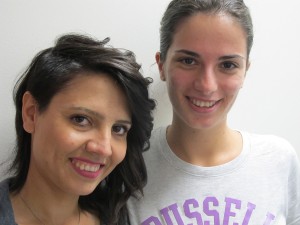Newcomers happy and keen to work, survey finds
 Newly arrived migrants and refugees overwhelmingly find Australia a welcoming place that is relatively free from racism, a new survey has found.
Newly arrived migrants and refugees overwhelmingly find Australia a welcoming place that is relatively free from racism, a new survey has found.
Getting stable work and seeing their children educated and prosper are the priorities for new arrivals; and lifestyle and leisure as well as safety and security are the things they most appreciate about Australia.
The study found unemployment and crime or violence were the biggest immediate fears among newcomers while three quarters of respondents said life in Australia met their expectations.
The survey canvassed 400 newly-arrived migrants and refugees in Melbourne and Sydney asking about their hopes, fears and expectations of settling in Australia.
Commissioned by settlement agency AMES, the study surveyed people from 51 different nations over six weeks in September and October 2013.
Almost 60 per cent said they were happy in Australia all or most of the time. Only four per cent said they were unhappy, the survey found.
‘A better lifestyle’ (34 per cent) was the most common reason for coming to Australia while 26 per cent cited their ‘children’s future’ and 20 per cent said ‘personal safety’.
Asked whether they felt welcome in Australia, 70 per cent said they did and 14 per cent said they did most of the time. Only 3 per cent said they felt unwelcome.
Sixty-nine per cent said they were made to feel welcome by government and institutions and 49 per cent they found ordinary people welcoming; with another 23 per cent saying they were welcomed by ordinary people ‘most of the time’.
Almost 90 per cent of respondents said they had not been the victims of racism. Among the 11 per cent who did experience racism were 3 per cent who said they had been told to “go home”.
The main short term goal of most respondents (53 per cent) was to get a job, with 15 per cent saying they wanted to start a business. Twelve per cent cited wanting to learn English and 10 per cent said they wanted to secure their family’s future.
Seeing their children educated was the most common long-term goal among the respondents (37 per cent) while 25 per cent cited running a successful business and 16 per cent owning a house.
Learning English was seen as the most important factor in settling successfully in Australia (52 per cent) with finding job being cited by 25 per cent of respondents.
Finding work was also the biggest worry among newcomers with 59 per cent saying so.
Safety and security as well as lifestyle and leisure were seen as the best aspects of living in Australia (26 and 24 per cent respectively) with 15 per cent citing health care and 14 per cent career opportunities.
Missing family and friends (51 per cent) was the worst aspect of life in Australia for most newcomers.
Unemployment (52 per cent) and violence or crime (19 per cent) were the greatest immediate fears respondents had relating to their new life in Australia.
Despite this, 79 per cent said they intended to stay in Australia permanently and 75 per cent said life in Australia was as they thought it would be before they left their home countries. Twenty-three per cent said life in Australia had not met their expectations.
Teachers and police and emergency workers (27 and 26 per cent respectively) were the groups of people most admired by newcomers to Australia, the survey found.
It found on 5 per cent of respondents admired politicians and only 2 per cent admired celebrities while 11 per cent admired sports people.
Tony Abbott was deemed the most famous Australian with 35 per cent choosing the Prime Minister. Twelve per cent said Russell Crowe and Ricky Ponting were the most famous Aussies while seven per cent plumped for Nicole Kidman.
Kangaroos were overwhelmingly the most recognisable symbol of Australia with 54 per cent of respondents citing the marsupial.
Twenty-one per cent of respondents said ‘learn English first’ was the one piece of advice they would give to people in their home countries who were thinking of coming to Australia.
Asked what they thought Australians should know about migrants and refugees, the most common response was that Australians didn’t understand the culture and traditions of many new arrivals (27 per cent)
Another common response (12 per cent) was that Australians did not appreciate the conditions and difficulties in many of the countries from which the respondents have come.
Survey respondent Ayse Ipek, said “I like Australia very much. The life here is very comfortable and well organised. We have a stable government that is accountable to the people and I have been made to feel very welcome by most people”.
For more information, download the full findings.












